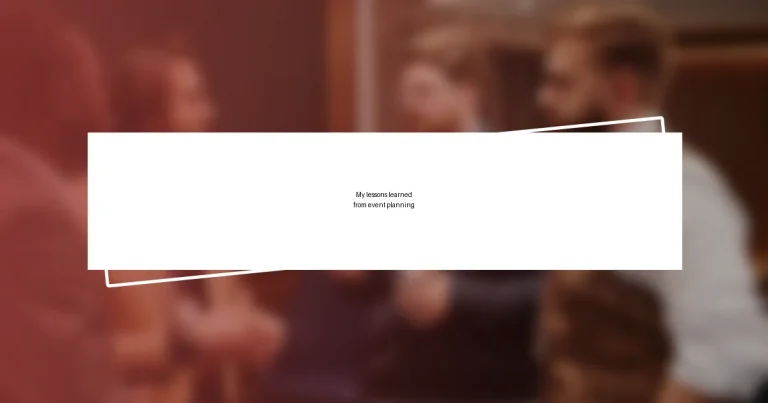Key takeaways:
- Understanding the target audience and setting clear goals are essential for creating impactful events.
- Budgeting requires detailed planning and monitoring to avoid overspending and ensure financial viability.
- Building strong relationships with vendors can provide crucial support during unforeseen challenges.
- Regular feedback and evaluation help in identifying areas for improvement and enhance future event planning.

Understanding event planning basics
Event planning might seem like a straightforward task, but it’s a delicate dance of organization and creativity. When I first started planning events, I underestimated the importance of details. I remember frantically searching for a last-minute venue decoration that I thought I could skip; it occurred to me then that every little aspect contributes to the overall experience.
In my experience, understanding the target audience is crucial. Each event has its unique vibe, and I often ask myself, “What does my audience want to take away from this experience?” For instance, at a charity gala I organized, tailoring the activities to engage our guests not only enhanced their experience but also significantly boosted donations. This connection makes all the difference.
Budgeting is another foundational element often overlooked. I can tell you from experience—the thrill of planning can sometimes cloud judgment. A few years back, I found myself overspending on entertainment because I got caught up in excitement. That taught me the hard way that maintaining a balanced budget helps keep the event sustainable and stress-free. It’s a lesson I remind myself of every time I start a new project.
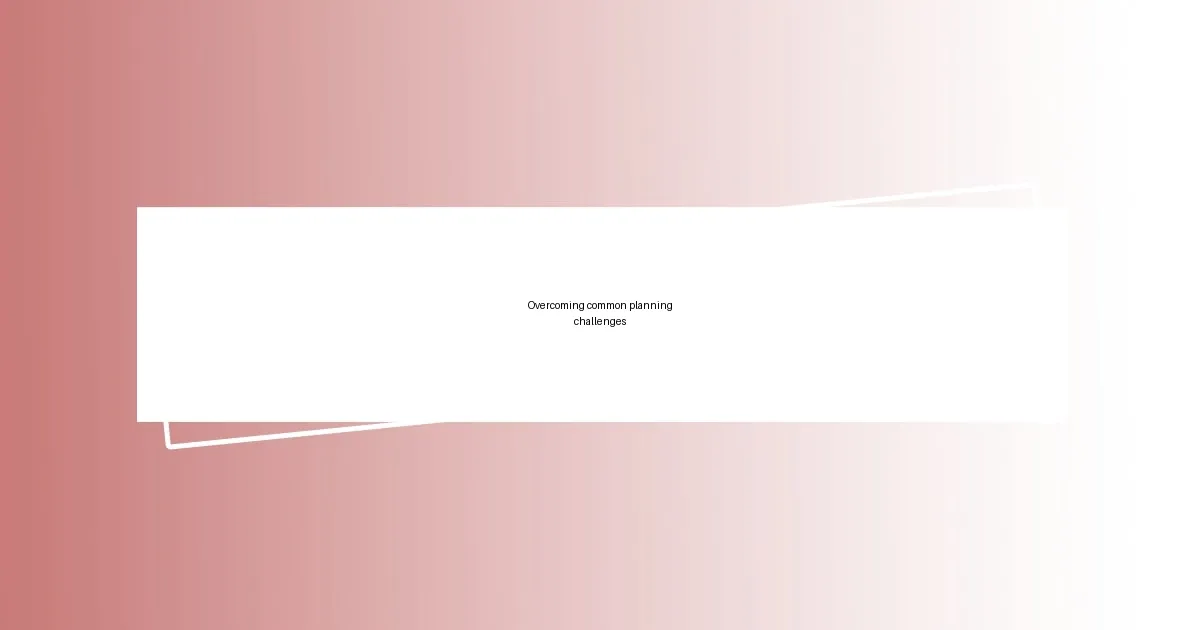
Overcoming common planning challenges
Planning events can be an exhilarating journey, yet it often comes with its own set of hurdles. I vividly recall a time when a key speaker canceled just days before an event. It was panic-inducing! However, I learned that maintaining strong relationships with backup speakers can turn a disaster into an unexpected opportunity. This experience taught me the importance of flexibility and having a Plan B in my back pocket.
Here are some common challenges and how to tackle them effectively:
- Timeline Management: Set realistic deadlines and always build in extra time for unexpected delays.
- Vendor Reliability: Establish clear communication and check references before finalizing agreements with vendors.
- Budget Constraints: Prioritize spending and keep a close eye on your budget throughout the planning process.
- Unexpected Changes: Develop a crisis management plan that outlines how to handle last-minute changes, whether it’s a change in location or a guest speaker.
- Guest Engagement: Get creative with activities that resonate with the audience, ensuring they feel involved and valued during the event.
Each challenge can become a stepping stone to greater success when confronted with the right mindset.
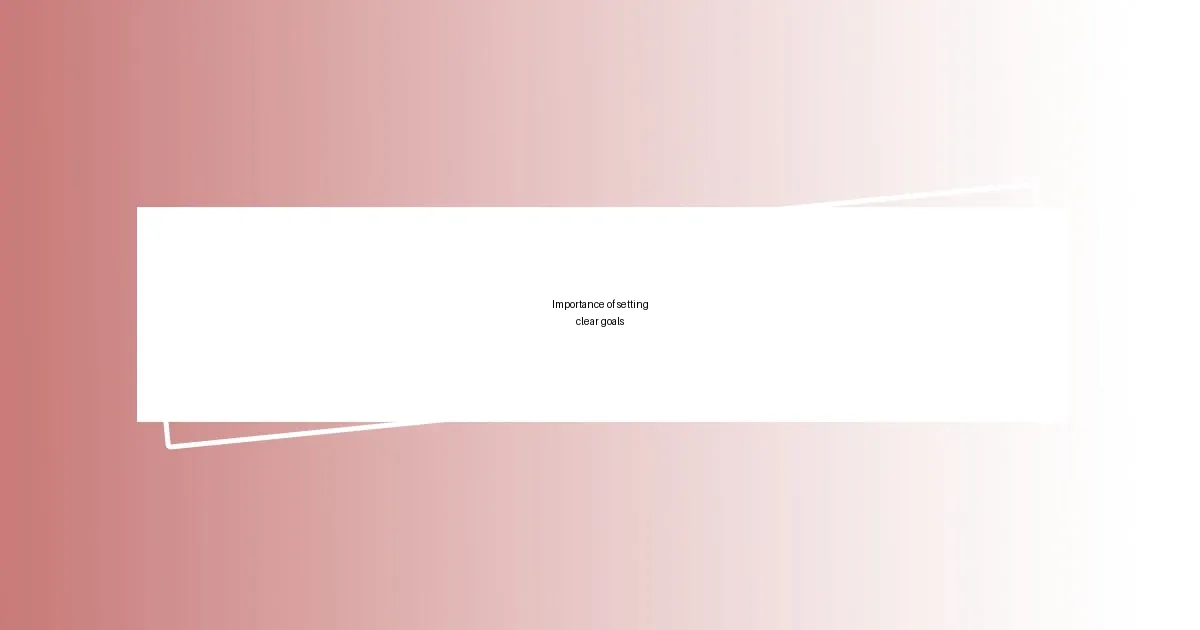
Importance of setting clear goals
Setting clear goals is essential in event planning, as it acts like a roadmap guiding you through the entire process. I’ve learned this the hard way—during my first major event, I had a vague idea of my objectives, and as a result, the event lacked focus. Guests left feeling unsure about what they had experienced, and I realized that without specific goals, both the planning and execution could easily spiral out of control.
When I think about how clarity shapes outcomes, I remember a corporate retreat I organized. I set a clear goal: to foster teamwork and connection among participants. With that in mind, I was able to design activities that aligned perfectly with our purpose. The feedback was overwhelming; people shared how meaningful the experience was. It was a profound lesson in realizing that having a defined goal transforms an event from just another gathering into a memorable experience.
Additionally, clearly defined goals help you evaluate success post-event. Reflecting on goals allows you to measure what went right and what needs improvement. For instance, after an art exhibition I managed, understanding that our aim was to engage local artists led me to analyze the turnout based on our outreach efforts. The results guided me in refining my approach for future events, demonstrating that setting specific goals doesn’t just lead to better planning—it also lays the groundwork for continuous growth.
| Goal Setting | Impact |
|---|---|
| Clear objectives | Guides planning and execution |
| Focus on key outcomes | Enhances guest experience |
| Measurable success | Informs future events and strategies |

Effective budgeting strategies for events
Budgeting is one of those crucial elements that can make or break an event. I recall a festival I organized where my initial budget felt sufficient, only to realize I had overlooked costs like permits and insurance. It was a tough lesson in recognizing that every little detail counts. To avoid such pitfalls, I now create a detailed budget breakdown before any planning begins, categorizing every expected expense and adding a contingency fund of about 10% just in case. This strategy gives me peace of mind, as I know I have a safety net.
Another effective budgeting strategy is to negotiate with vendors for better rates or package deals. I once managed a conference where I approached multiple catering services, not just asking for quotes but negotiating the value of what they could provide. By communicating the scale of the event and potential for future partnerships, I secured discounts that saved us thousands. Have you ever considered how a little negotiation can lead to significant savings? I’m always resonating with the idea that every dollar saved is a dollar that can enhance attendee experience.
Finally, tracking expenses in real-time is vital. During a charity gala I hosted, maintaining a shared spreadsheet with my team helped us stay on top of our budget. Whenever a payment was made or an unexpected expense arose, we updated the sheet immediately. This transparency not only kept us accountable but also empowered us to make informed decisions quickly. I can’t stress enough how crucial it is to have a clear picture of your finances throughout the entire planning process. How do you monitor your expenses during events? For me, it’s all about staying proactive and responsive to budget changes, ensuring the event remains financially viable.
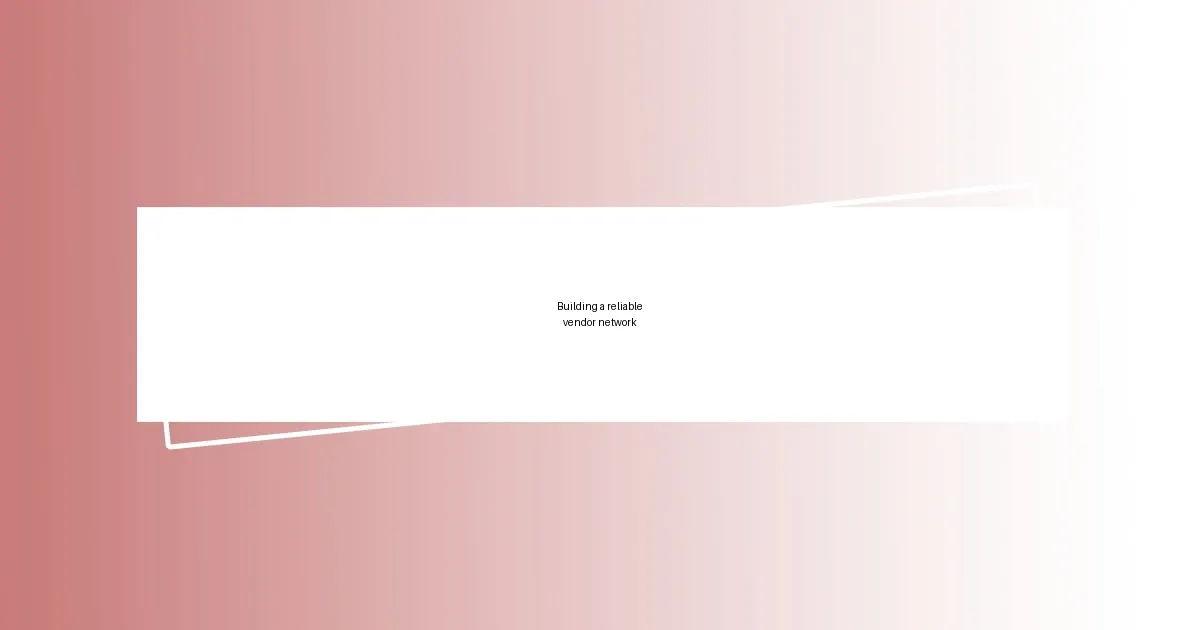
Building a reliable vendor network
Building a reliable vendor network is like cultivating a garden; it requires attention, care, and a bit of time. I remember a particularly challenging event where a last-minute change led to my original catering vendor backing out. The scramble to find a trustworthy replacement was anxiety-inducing but also a wake-up call. I learned firsthand that having a robust network of reliable vendors is key to ensuring smooth operations, even when unexpected challenges arise.
Investing time in building relationships with vendors can yield impressive rewards. For instance, after I worked closely with a florist for a series of weddings, she began to understand my style and vision. The relationship bloomed—pun intended—into a partnership where she could provide not just flowers but creative suggestions that took the event aesthetics to the next level. Has a vendor ever surprised you with their insight? Creating this kind of rapport fosters an environment where both parties can thrive.
It’s also essential to maintain open communication with your vendor network. During an outdoor music festival I planned, inclement weather threatened our setup. Because I’d established a solid relationship with the sound crew, I could reach out to them quickly for contingency plans. Their readiness to adapt and collaborate alleviated my stress and ensured the show went on seamlessly. Isn’t it reassuring when you know you can count on someone during a crisis? That’s the power of a reliable vendor network—it transforms potential disasters into mere bumps in the road.
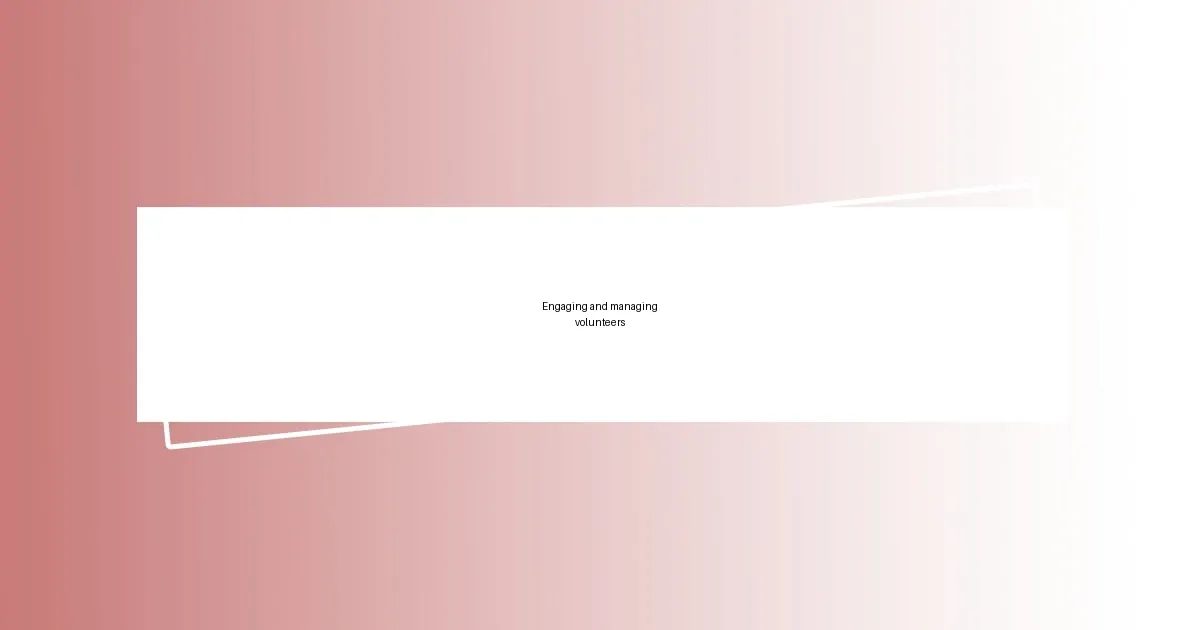
Engaging and managing volunteers
Engaging and managing volunteers is an art much like event planning itself. I once coordinated a community run and found that initial enthusiasm can often diminish quickly if volunteers feel unrecognized or unsupported. I prioritized regular communication, sharing updates and progress on our event goals—this made the volunteers feel valued and connected to our larger mission. Isn’t it incredible how a simple thank-you or check-in can boost morale?
Clearly defined roles and responsibilities can make a significant difference in maintaining volunteer engagement. For instance, during a local fundraiser, I implemented a buddy system. Each volunteer partnered with someone they could rely on, fostering a sense of camaraderie that kept them motivated. It was heartwarming to see how laughter and teamwork flourished, reminding me that people are more likely to stay committed when they feel included and part of a community. Have you ever witnessed how collaboration can transform a task into a joyful experience?
Lastly, offering opportunities for skill development can be a game-changer. While planning an educational workshop, I designed volunteer roles that allowed individuals to learn something new—like event marketing or project management. Their excitement was palpable, and I found that by investing in their growth, I not only retained their passion but also created a more competent team. What skills have you developed through volunteering? I believe that when volunteers feel they’re gaining valuable experiences, they’re more likely to return for future events, enhancing both the experience and the efficiency of the event itself.
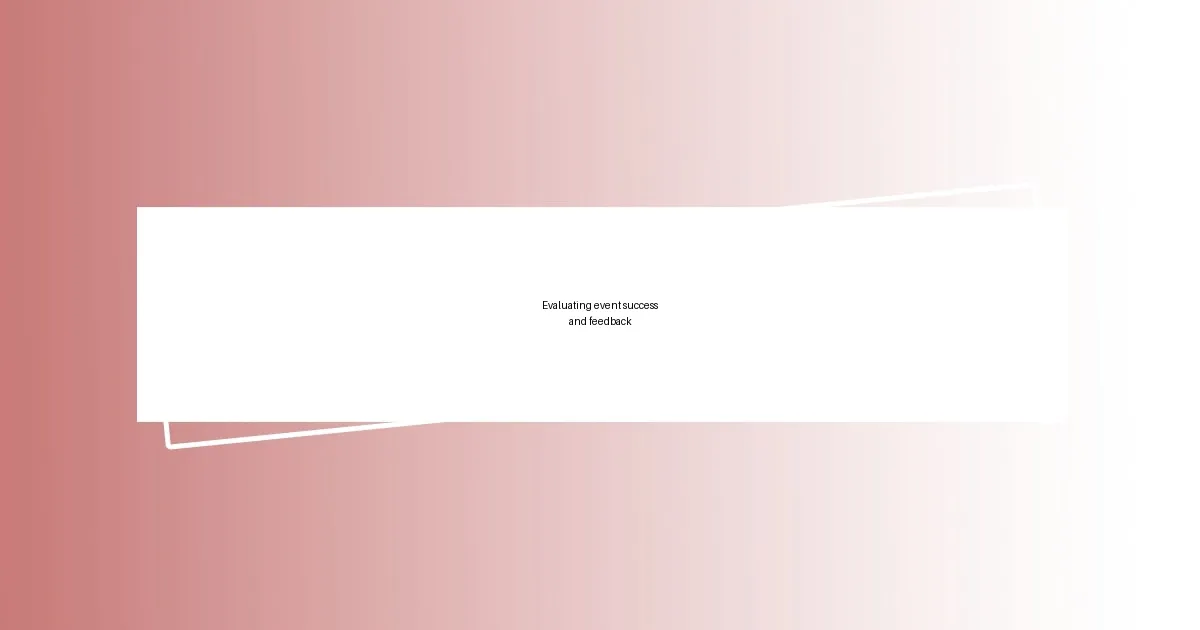
Evaluating event success and feedback
Evaluating the success of an event goes beyond just attendance numbers; it’s also about the experience participants take away. After hosting a charity gala, I sent out a feedback survey to attendees, hoping to glean insights into their experiences. The responses were eye-opening—many praised the ambience but noted that the program felt a bit rushed. Has feedback ever reshaped your understanding of an event’s impact? It’s fascinating how those small comments can unveil areas for improvement you might not have considered.
The feedback process can feel a bit daunting, but I’ve learned to embrace it as a valuable tool for growth. I remember a networking event where the initial feedback highlighted the need for more structured activities. Instead of feeling disheartened, I tackled it head-on, brainstorming creative solutions for future events. Incorporating structured discussions not only enhanced engagement but also fostered connections that attendees later expressed gratitude for. How often do we underestimate the power of simple tweaks based on feedback? It can truly transform an experience.
Moreover, I find that sharing the results with my team creates an environment of transparency and collaboration. After a community fair, I gathered everyone to review the feedback and celebrate our successes while addressing areas needing attention. The collective discussion opened new avenues and helped foster a sense of ownership among team members. Have you ever seen how collaborative reflection can inspire innovation? It’s moments like these that reinforce my belief that evaluation is not just a task but a journey of continuous improvement.












